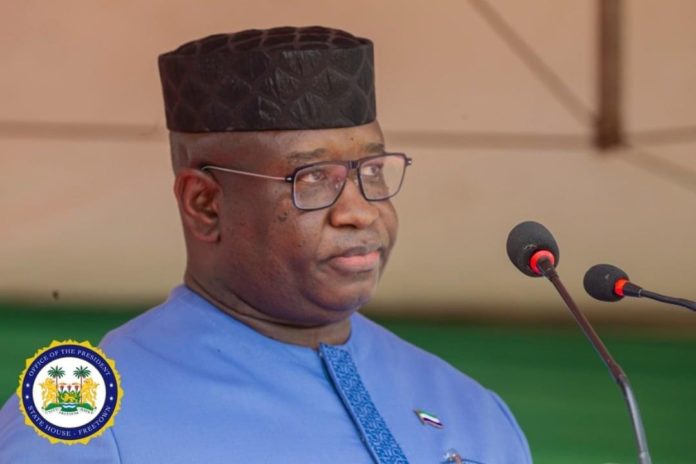By Foday Moriba Conteh
President Julius Maada Bio on the 13 January 2022 launched the Government white paper on the review of the 1991 Constitution of Sierra Leone, accepting major recommendations and announcing the implementation of some of them already.
The event was held at the lawn inside State House and in attendance were members the diplomatic community, those who served on the review process, representatives of political parties, parliamentarians, women organizations, non-governmental organizations, civil society groups and pupils from secondary schools.
According to President Bio:“Rather than shy away from the hard-hitting recommendations of the Truth and Reconciliation Commission as my predecessor did, I have actively implemented them because I believe that those Governance reforms are in the best interests of this nation.”
He added that recently he had worked with Parliament, the Judiciary, development partners, and civil society organizations to implement over half a dozen of the key governance and legislative imperatives outlined in the Truth and Reconciliation Report (TRC).
“My Government has repealed Part V of the Public Order Act; there is no journalist in prison for the practice of journalism; the Sierra Leone Association of Journalists and international media and free speech organizations have been consistent that free speech and the practice of journalism are indeed unfettered.
“My Government has established the Independent Commission for Peace and National Cohesion to identify and resolve potential triggers of conflict in our nation. According to the Global Peace Index, we are the fourth most peaceful country in Africa…My Government has permanently abolished the brutal and inhumane death penalty for all crimes…We have deepened and speeded up the process of decentralization. We have decongested prisons, improved prison conditions, and significantly expanded access to justice. We will continue doing more,” President Bio noted.
He recalled that his Government had also established a standalone Ministry of Gender and Children’s Affairs and introduced policies and laws to protect and promote the rights of children and women, adding that a gender empowerment and equality law is already in Parliament while they reviewed the Child Rights Act.
“Social safety, persons with disability, mental health care, improving healthcare, and free quality education for our children have all been at the centre of our agenda to invest in an inclusive and sustainable future for this nation. Add this to our sustained and much-lauded fight against corruption, our institutional and governance reforms, and our overall commitment and success in ruling justly and investing in people,” he said.
United Nations Resident Coordinator, Dr Babatunde Ahonsi, said the occasion was important for the future of Sierra Leone and its democratic consolidation, peace building and state-building processes.
He commended President Bio for the launch of the white paper, which he said represented the conclusion of the initial phase of the constitutional review process and the opening of a new stage of the process.
“Today’s launch is a fulfillment of the pledge made by Sierra Leone during the Universal Periodic Review on Human Rights in May 2021 that it will finalize the Constitutional Review Process. The UN system here in Sierra Leone, in collaboration with other development partners, stands ready to support with requisite capacities, ensuring that the process is broadly consultative and fruitful, while leaving no one behind,” he noted.
Speaker of Parliament, Dr Abass Chernor Bundu, said the country had had a constitutional democracy since she recovered her independence from Britain, adding that the promotion and maintenance of peace, security, order and good governance is the primordial duty of the organs of state, including parliament, which he said had the sole mandate to make laws in the country.
Dr Bundu further noted that many attempts by past Governments to amend the 1991 Constitution proved difficult and impossible, adding that it behooves every Sierra Leonean to maintain unflinching fidelity to the 1991 Constitution until such a time when the country would get a new one.




